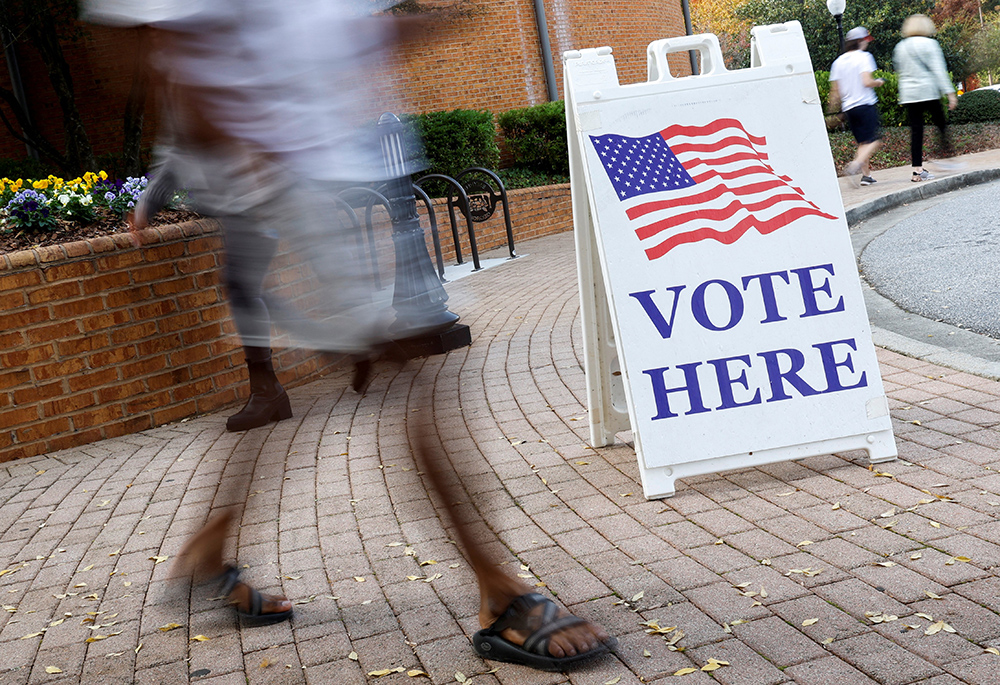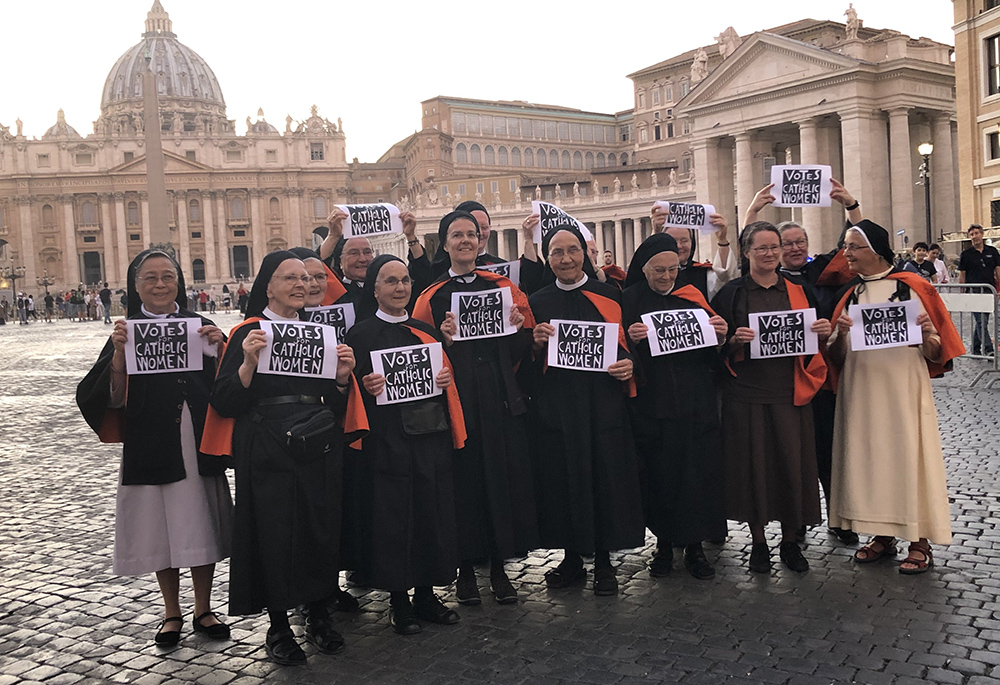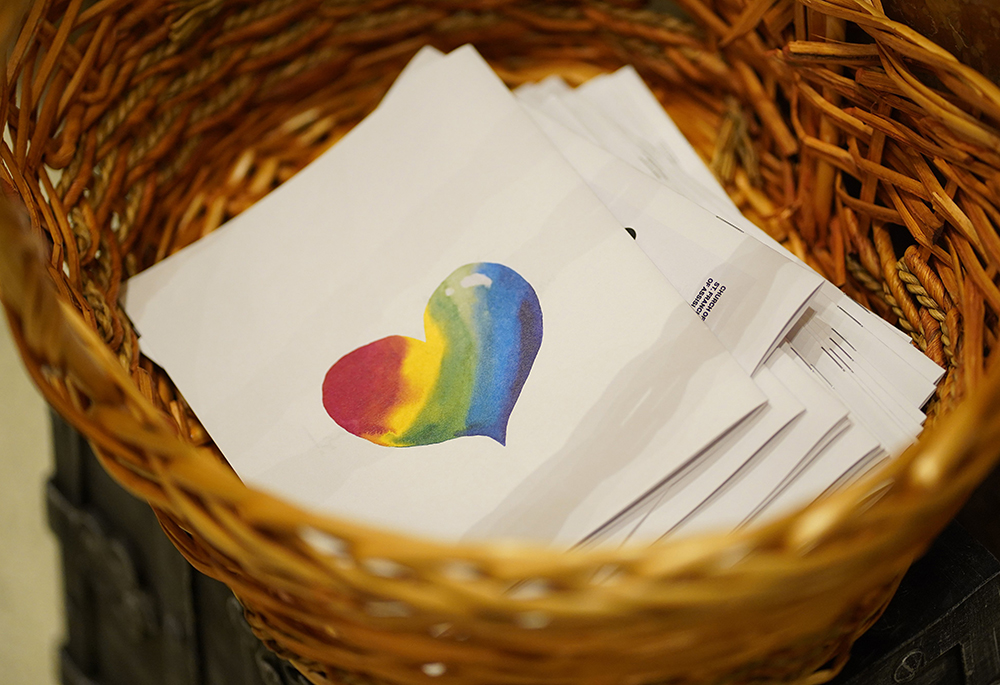
People at the Smyrna Community Center in Smyrna, Georgia, visit an early voting location Nov. 3, 2022, during midterm elections. (CNS/Reuters/Jonathan Ernst)
Recently, I was subjected to a disappointing message from the pulpit that felt like a step back in time to the 2016 election season. The presiding priest and his accompanying deacon preached about why they believed people should support former President Donald Trump in the 2024 presidential race.
Both ordained men portrayed Trump as "leading Christians in a spiritual battle" against gay couples and women who seek abortions, and named these two groups as responsible for all evil we see in society today. The deacon then blamed the empty pews on his parishioners, pointing to their hesitancy to speak out against these groups as the reason many people had left.
I noticed unease in the room: Women stood up and left, young people glanced at their parents hoping for a response, and elderly parishioners looked puzzled and uncomfortable. It struck me that I could not imagine a less synodal approach to talking about this election; it felt as if I was listening to a pre-synods homily, instead of one in 2024.
Throughout the past three years of the synod on synodality, our homework has been to consider the needs of our parishioners and those who are marginalized and feel excluded from the church. The people of God have been actively discerning the gifts that women and LGBTQ+ Catholics bring to the church. Learning from their lived experience was meant to inform the future that we collectively envision.
Women and our stories have been particularly highlighted, included and listened to in the synod process. For far too long, our church has over-criticized and judged women for the decisions we make — from the most controversial to the minor — without listening to our stories or considering us credible witnesses of the Gospel. During the synodal process however, we have been discerning how to better listen to the stories of women, and how to find ways in which women's already-existing leadership and calling is further recognized. At this point, there should be no place in the church where women are judged; on the contrary, our God-given gifts and callings must be treasured.

A group of Benedictine nuns from Fahr Monastery near Basel, Switzerland, call for "Votes for Catholic Women" at the Vatican during the October 2019 Synod of Bishops for the Amazon. (OSV News/Global Sisters Report/Deborah-Rose Milavec)
LGBTQ+ people have also been villainized for far too long, mainly because of a lack of understanding of what it means to be an LGBTQ+ person and a lack of proximity to our lived experiences.
At the conclusion of the 2018 Synod of Bishops on young people, the faith and vocational discernment, the synod's final report reminded us of the many questions young people — including those who closely follow church teaching — ask as they "express a wish to hear from the Church a ... humane and empathetic word." Young people conveyed that "sexual morality gives rise to incomprehension and distancing from the Church, inasmuch as she is perceived as a place of judgement and condemnation." They also expressed a desire to discuss questions on issues such as "the difference between masculine and feminine identity, the reciprocity between men and women," and LGBTQ+ persons.
Interestingly, the concerns voiced by young people align closely with the reasons "nones" — people who have left the church and claim no religious affiliation — often cite for no longer identifying with institutionalized religion. Bad experiences with religious people and a sense of irrelevance are key factors that have driven "nones" away. According to Pew Research Center, 43% of religious "nones" say religion does more harm than good in American society.
If we've been doing our homework, this 2024 election season should not mirror 2016. In recent times, we have embarked on a synodal journey, starting with the synods on the family, followed by the synod on young people, the synod on the Pan-Amazon region and now the synod on synodality. In each of these synods, the institutional church has been called to become more human, empathetic and attentive to the lived experiences of women and, in three of these synods, also of LGBTQ+ people.

Programs are seen in a basket prior to the annual "Pre-Pride Festive Mass" at St. Francis of Assisi Church in New York City, on June 29, 2024. The liturgy, hosted by the parish's LGBT+ ministry, is traditionally celebrated on the eve of the city's Pride parade. (OSV News/Gregory A. Shemitz)
The Holy Spirit is guiding the church in a more holistic direction, one in which the stories of women and LGBTQ+ people are heard, where we seek to understand the distinction between sexual orientation and gender identity, recognizing both as separate and distinct. This journey involves acknowledging and uplifting the God-given gifts of these two groups, in particular.
How might this synodal posture transfer to the decision of how to vote?
Advertisement
When it comes to elections, the role of the institutional church is not to replace our consciences by telling us how to vote. The church's role is to form our conscience holistically, considering all aspects of the human person, listening to the stories and issues that affect our everyday lives.
It is also the institutional church's role to challenge both parties whenever they fail to be a prophetic voice for the poor, marginalized and vulnerable; including those the church doesn't fully understand. More than anything, the institutional church must always challenge and outright condemn hateful rhetoric from the pews, the political campaign trail and beyond.
Then, each Catholic must vote their conscience; our well-formed conscience, informed by the lived experience of those we come in touch with on a daily basis, has primacy over everything else.







